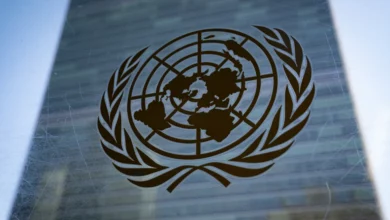Prominent Egyptian human rights activist Saad Eddin Ibrahim on Sunday said he expected US Congress to approve a resolution in support of democratic reform in Egypt within two weeks.
The resolution, submitted by 11 senators, calls for the abolition of Egypt's longstanding emergency law, the international supervision of national elections and an end to the policy of random arrest and torture.
At a conference devoted to peaceful democratic transition in Egypt, organized recently in Washington by the Alliance of Egyptian Americans (AEA), Ibrahim predicted that the resolution would pass by majority vote in both houses of congress.
According to Ibrahim, however, congress has not been subject to pressure "in any way" by Egyptians resident in the US. “Congress is already concerned with what happens in Egypt,” he said.
Ibrahim also called on the National Association for Change, established by potential independent presidential candidate Mohamed ElBaradei, to protect itself from possible harassment by Egyptian security bodies. “No five people can get together in Egypt without one of them being an undercover security agent,” he said.
The rights advocate further called on the AEA to supervise national elections in Egypt and establish a fund mandated with financing demonstrators who currently lack the resources to organize popular protests–a state of affairs that Ibrahim said constitutes a "weak point" that can be taken advantage of by police.
AEA communications officer Mokhtar Kamel said at the conference that the US would use the resolution to pressure Egypt for democratic change, noting that the resolution enjoyed the support of both democratic and republican representatives.
“Democratic Senator Russell Finegold and Republican Senator John McCain, both of whom are ardent supporters of Israel, also support the resolution,” Kamel said, noting that even supporters of Israel were "not satisfied" with the pace of political reform in Egypt.
Michele Dunne, senior associate at the Carnegie Endowment for International Peace (CEIP), a Washington-based think tank, explained that the role of CEIP’s Egypt chapter was to both draw the attention of the US administration to the "serious situation" in Egypt and to "pressure the regime for more democracy."
“Egypt has become the sick man of the Middle East,” Osama al-Ghazali Harb, president of Egypt's Democratic Front opposition party, said at the conference. “This is the result of a weak regime that is unable to make ends meet,” he added, pointing to what he described as “the abrupt absence of President Hosni Mubarak from the political scene.”
Harb went on to say that ElBaradei had manged to "embarrass the Egyptian opposition," which, he noted, had traditionally remained under the wing of the ruling regime.
He also said that, whenever Egypt faced problems of a sectarian nature–as in the recent abduction of a Coptic Christian woman–Egyptian Copts resorted to church authorities rather than to accepted legal channels. “It looks like the Coptic Church has become the de facto mouthpiece for Egyptian Christians,” he said.
Harb also lashed out at the Wafd opposition party for its recent decision to participate in upcoming parliamentary elections slated for November.
For his part, Mustafa al-Naggar, representative of a popular campaign in support of an ElBaradei presidential run, for the first time revealed ElBaradei’s strategy for peaceful democratic change.
“It has five stages,” he explained. “It begins with triggering a revolution of the minds; followed by a preparation of the masses; then their empowerment; then their direct advancement to a peaceful resolution; and, finally, the civilized action.”
He went on to point to ElBaradei's recent calls for civil disobedience on a popular level. "But he knows this cannot be done at the moment,” said al-Naggar, expressing hope that at least 20 percent of those that had signed a petition in support of ElBaradei would actively participate in the campaign.
“The authorities want us to work in secret so they can label us a 'banned group',” he added. “But we insist on working in broad daylight.”
AEA coordinator Sabri al-Baga noted that lawyers Yehia al-Gamal and Mohamed Khodeiri had filed a lawsuit against the Egyptian government to demand that Egyptian nationals abroad be allowed to vote in upcoming elections. “Only a few expatriates have confirmed their participation, however,” he noted, going on to call for more active participation in support of his lawsuit.
AEA President Mahmoud al-Shazli, for his part, said the alliance had begun preparing a database of some one million Egyptian Americans whom AEA officials hoped would join the alliance.
Translated from the Arabic Edition.




